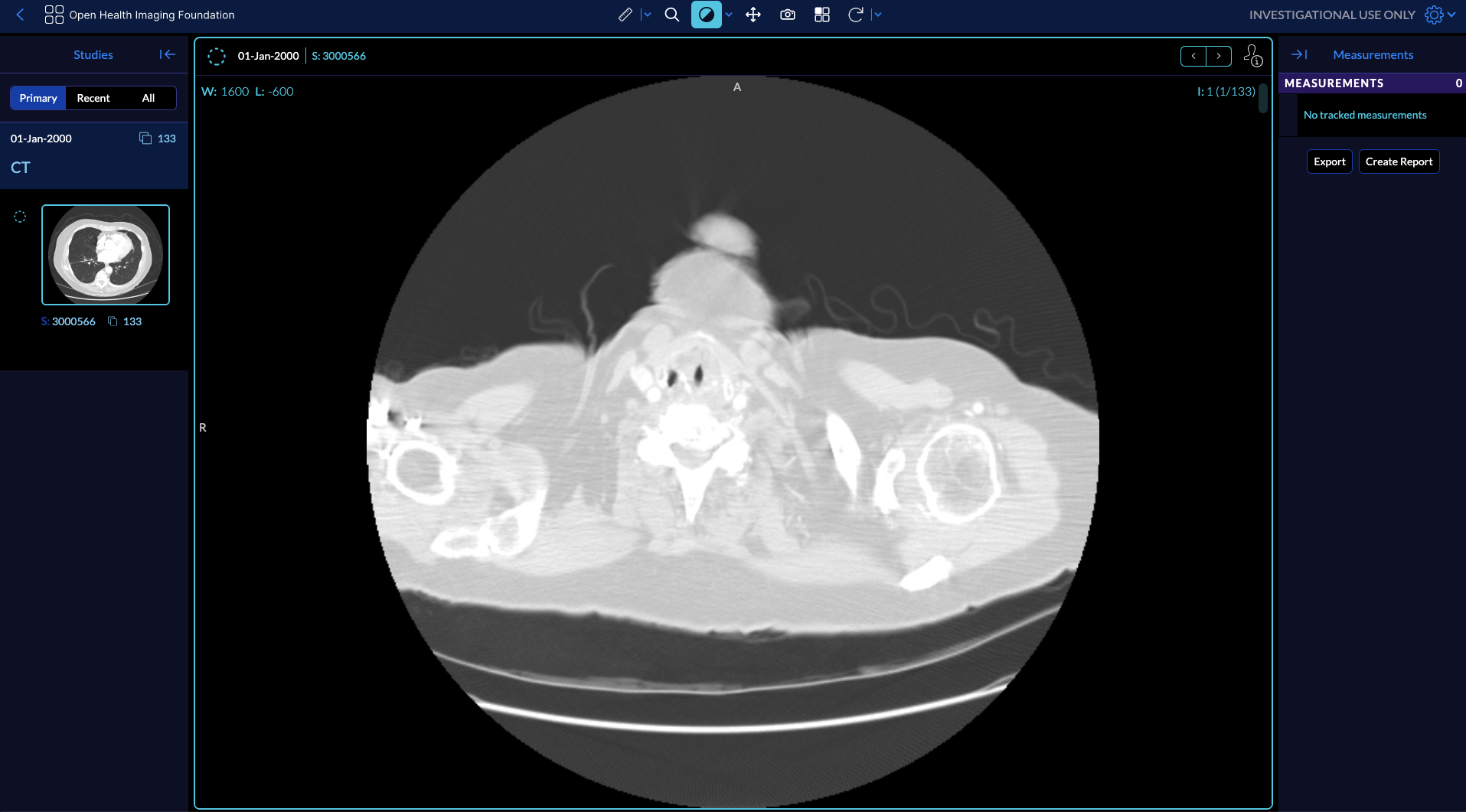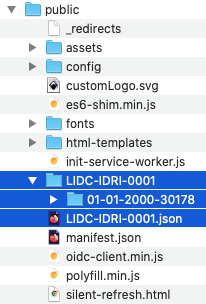DICOM JSON
You can launch the OHIF Viewer with a JSON file which points to a DICOMWeb server as well as a list of study and series instance UIDs along with metadata.
An example would look like
https://viewer.ohif.org/viewer/dicomjson?url=https://ohif-dicom-json-example.s3.amazonaws.com/LIDC-IDRI-0001.json
As you can see the url to the location of the JSON file is passed in the query
after the dicomjson string, which is
https://ohif-dicom-json-example.s3.amazonaws.com/LIDC-IDRI-0001.json (this
json file has been generated by OHIF team and stored in an amazon s3 bucket for
the purpose of the guide).
DICOM JSON sample
Here we are using the LIDC-IDRI-0001 case which is a sample of the LIDC-IDRI dataset. Let's have a look at the JSON file:
Metadata
JSON file stores the metadata for the study level, series level and instance level. A JSON launch file should follow the same structure as the one below.
You can use our script to generate the JSON file from a hosted endpoint. See
.scripts/dicom-json-generator.js
You could run it like this:
node .scripts/dicom-json-generator.js '/path/to/study/folder' 'url/to/dicom/server/folder' 'json/output/file.json'
Some modalities require additional metadata to be added to the JSON file. You can read more about the minimum amount of metadata required for the viewer to work here. We will handle this in the script. For example, the script will add the CodeSequences for SR in order to display the measurements in the viewer.
Note that at the instance level metadata we are storing both the metadata and
also the url for the dicom file on the dicom server. In this case we are
referring to
dicomweb:https://ohif-dicom-json-example.s3.amazonaws.com/LIDC-IDRI-0001/01-01-2000-30178/3000566.000000-03192/1-001.dcm
which is stored in another directory in our s3. (You can actually try
downloading the dicom file by opening the url in your browser).
The URL to the script in the given example is https://ohif-dicom-json-example.s3.amazonaws.com/LIDC-IDRI-0001/01-01-2000-30178. This URL serves as the parent directory that contains all the series within their respective folders.
{
"studies": [
// first study metadata
{
"StudyInstanceUID": "1.3.6.1.4.1.14519.5.2.1.6279.6001.298806137288633453246975630178",
"StudyDate": "20000101",
"StudyTime": "",
"PatientName": "",
"PatientID": "LIDC-IDRI-0001",
"AccessionNumber": "",
"PatientAge": "",
"PatientSex": "",
"series": [
// first series metadata
{
"SeriesInstanceUID": "1.3.6.1.4.1.14519.5.2.1.6279.6001.179049373636438705059720603192",
"SeriesNumber": 3000566,
"Modality": "CT",
"SliceThickness": 2.5,
"instances": [
// first instance metadata
{
"metadata": {
"Columns": 512,
"Rows": 512,
"InstanceNumber": 1,
"SOPClassUID": "1.2.840.10008.5.1.4.1.1.2",
"PhotometricInterpretation": "MONOCHROME2",
"BitsAllocated": 16,
"BitsStored": 16,
"PixelRepresentation": 1,
"SamplesPerPixel": 1,
"PixelSpacing": [0.703125, 0.703125],
"HighBit": 15,
"ImageOrientationPatient": [1, 0, 0, 0, 1, 0],
"ImagePositionPatient": [-166, -171.699997, -10],
"FrameOfReferenceUID": "1.3.6.1.4.1.14519.5.2.1.6279.6001.229925374658226729607867499499",
"ImageType": ["ORIGINAL", "PRIMARY", "AXIAL"],
"Modality": "CT",
"SOPInstanceUID": "1.3.6.1.4.1.14519.5.2.1.6279.6001.262721256650280657946440242654",
"SeriesInstanceUID": "1.3.6.1.4.1.14519.5.2.1.6279.6001.179049373636438705059720603192",
"StudyInstanceUID": "1.3.6.1.4.1.14519.5.2.1.6279.6001.298806137288633453246975630178",
"WindowCenter": -600,
"WindowWidth": 1600,
"SeriesDate": "20000101"
},
"url": "dicomweb:https://ohif-dicom-json-example.s3.amazonaws.com/LIDC-IDRI-0001/01-01-2000-30178/3000566.000000-03192/1-001.dcm"
},
// second instance metadata
{
"metadata": {
"Columns": 512,
"Rows": 512,
"InstanceNumber": 2,
"SOPClassUID": "1.2.840.10008.5.1.4.1.1.2",
"PhotometricInterpretation": "MONOCHROME2",
"BitsAllocated": 16,
"BitsStored": 16,
"PixelRepresentation": 1,
"SamplesPerPixel": 1,
"PixelSpacing": [0.703125, 0.703125],
"HighBit": 15,
"ImageOrientationPatient": [1, 0, 0, 0, 1, 0],
"ImagePositionPatient": [-166, -171.699997, -12.5],
"FrameOfReferenceUID": "1.3.6.1.4.1.14519.5.2.1.6279.6001.229925374658226729607867499499",
"ImageType": ["ORIGINAL", "PRIMARY", "AXIAL"],
"Modality": "CT",
"SOPInstanceUID": "1.3.6.1.4.1.14519.5.2.1.6279.6001.512235483218154065970649917292",
"SeriesInstanceUID": "1.3.6.1.4.1.14519.5.2.1.6279.6001.179049373636438705059720603192",
"StudyInstanceUID": "1.3.6.1.4.1.14519.5.2.1.6279.6001.298806137288633453246975630178",
"WindowCenter": -600,
"WindowWidth": 1600,
"SeriesDate": "20000101"
},
"url": "dicomweb:https://ohif-dicom-json-example.s3.amazonaws.com/LIDC-IDRI-0001/01-01-2000-30178/3000566.000000-03192/1-002.dcm"
}
// ..... other instances metadata
]
}
// ... other series metadata
],
"NumInstances": 133,
"Modalities": "CT"
}
// second study metadata
]
}

Local Demo
You can run OHIF with a JSON data source against you local datasets (given that their JSON metadata is extracted).
First you need to put the JSON file and the folder containing the dicom files
inside your public folder. Since files are served from your local server the
url for the JSON file will be http://localhost:3000/LIDC-IDRI-0001.json and
the dicom files will be
dicomweb:http://localhost:3000/LIDC-IDRI-0001/01-01-2000-30178/3000566.000000-03192/1-001.dcm.
After yarn install and running yarn dev and opening the browser at
http://localhost:3000/viewer/dicomjson?url=http://localhost:3000/LIDC-IDRI-0001.json
will display the viewer.
Download JSON file from here
Sample DICOM files can be downloaded from TCIA or directly from here
Your public folder should look like this:

It is important to URL encode the url query parameter especially if the url
parameter itself also contains query parameters. So for example,
http://localhost:3000/viewer/dicomjson?url=http://localhost:3000/LIDC-IDRI-0001.json?key0=val0&key1=val1
should be...
http://localhost:3000/viewer/dicomjson?url=http://localhost:3000/LIDC-IDRI-0001.json?key0=val0%26key1=val1
Notice the ampersand (&) is encoded as %26.
When hosting the DICOM JSON files, it is important to be aware that certain providers do not automatically handle the 404 error and fallback to index.html. For example, Netlify handles this, but Azure does not. Consequently, when you attempt to access a link with a specific URL, a 404 error will be displayed.
This issue also occurs locally, where the http-server does not handle it. However,
if you utilize the serve package (npx serve ./dist -c ../public/serve.json), it effectively addresses this problem.